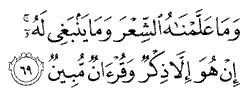Revelation and Poetry, Hypothetical Matters, Establish Others
Issue 952 » June 23, 2017 - Ramadan 28, 1438
Living The Quran
Revelation and Poetry
Ya Sin (Ya Sin) Sura 39: Verse 69
 "We have not taught the Prophet poetry; nor is it fitting for him [to be a poet). This is but a reminder and a Quran making all things clear."
"We have not taught the Prophet poetry; nor is it fitting for him [to be a poet). This is but a reminder and a Quran making all things clear."
God in all His limitless glory denies that He taught His Messenger the art of poetry. Since God did not teach him this, he will not learn it. No one will ever get to know anything other than what God teaches them. The verse also makes it clear that poetry is not suitable for God's Messenger.
Poetry takes a different line from that of prophethood. Poetry is an interaction which may change from time to time. Prophethood, on the other hand, means revelations bestowed from on high, outlining a firm system and a clear code that should be implemented as it conforms to God's law, which operates throughout the universe. Unlike poetry, it does not change to suit moods and desires.
Moreover, prophethood means constant contact with God, learning directly from what God reveals and an untiring attempt to mould human life in a way that pleases God. In its highest standards, poetry expresses a human longing for what is perfect and beautiful, but it remains a human effort confined within man's capabilities and limitations. At lesser levels, poetry is an expression of reactions and desires that may be strongly carnal. Indeed, prophethood and poetry are far apart: one is at best a longing that issues from the earth while the other is true guidance from on high. The role of revelation is to be a reminder as it works on the mind keeping it alert, and the Quran is to be recited.
Compiled From:
"In the Shade of the Quran" - Sayyid Qutb, pp. 224, 225
Understanding The Prophet's Life
Hypothetical Matters
Prophet (peace be upon him) disliked being questioned about all hypothetical matters. In a Tradition narrated by Bukhari on the authority of Saad ibn Abi Waqqas, the Prophet is reported to have said: "The most sinful person among the Muslims is the one who asked about something which had not been prohibited, but was prohibited because of his asking." [Bukhari]
Reported by Abu Thalabah al-Khushani that the Prophet said: "God has set boundaries, so do not transgress them; He kept silent on certain things out of mercy for you rather than forgetfulness, do not ask about them." [Daraqutni] Thus, Ibn Abbas said: "I have not seen better than Muhammad's Companions, they only asked him fifteen questions, all of which are [mentioned] in the Quran." [Qurtubi]
Compiled From:
"Treatise on Maqasid Al-Shariah" - Ibn Ashur, pp. 218, 219
Blindspot!
Establish Others
We can stop the vicious cycle of attack and counterattack, strike and counterstrike that holds the world in thrall today if we learn to appreciate the wisdom of restraint toward the enemy. We have witnessed the result of hard-line policies inspired by a righteousness that can see only worst in the enemy. We have seen the danger of ruthless retaliation that drives people to despair, ignores their needs, and refuses to take their aspirations seriously. We have become aware that when people feel that they have nothing to lose, they resort to hopeless, self-destructive measures.
In our global village, everybody is our neighbour, and it is essential to make allies of our enemies. We need to create a world democracy in which everybody's voice is heard and everybody's aspirations are taken seriously. In the last resort, this kind of "love" and "concern for everybody" will serve our best interest better than short-sighted and self-serving policies.
Retaliation is likely only to exacerbate the hatred and violence activated by the threat mechanism. On September 11, 2001, for example, there were demonstrations and expressions of sympathy for the United States in countries all over the world, including Palestine and Iran. If there had been a nonviolent and openhanded response to the attacks on the Twin Towers instead of a military offensive, might the outcome have been different? Remember Confucius's words: if you seek to establish yourself, then seek to establish others. Humiliating the enemy can be dangerous. The harsh conditions inflicted on Germany by the Treaty of Versailles after the First World War gave birth to the conditions that helped to bring Adolf Hitler to power. We need to find a way to ensure all peoples enjoy the treatment that we wish for ourselves. We have to try to look carefully and deeply into our own hearts and thus learn to see the sorrow of our enemy.
Compiled From:
"Twelve Steps to a Compassionate Life" - Karen Armstrong, pp. 180-188